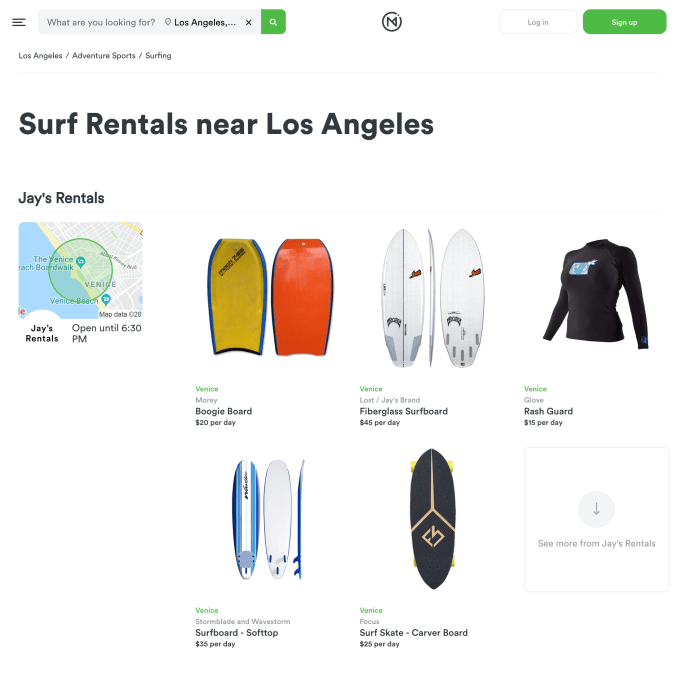Omni simply couldn’t scale storing stuff in giant warehouses while dropping it and off picking it up from people on demand. Storage was designed to bootstrap Omni into peer-to-peer rentals of the goods in its care. But now it’s found a better way by partnering with retailers that will host and rent out goods for Omni that users will pick up themselves.
With that strategy, Omni is now formally pivoting from storage, alongside its expansion from San Francisco and Portland into Los Angeles and New York. In SF and its new markets starting today, users can rent GoPros, strollers, drills, guitars and more for pickup and drop-off at 100 local storefronts, which will receive 80 percent of the revenue while Omni keeps 20 percent.
“Storage was always meant to supply a rentals marketplace. We launched storage in an Uber-for everything era and now it’s no secret that physical operations are tough to scale,” Omni’s COO Ryan Delk tells me. “This new model gives our users more supply, local entrepreneurs a new revenue stream, and us the ability to launch new markets much more quickly than the old model of building rentals on top of the storage business.”

LA Omni users will be able to rent surf equipment for pickup and drop-off from local surf shop Jay’s
To that end, storage won’t come to any more markets, though storage services with delivery will continue in San Francisco. Users there and in Portland will also be able to pick up and drop off rental items from a few Omni-owned locations, including its SF headquarter office. Omni will add retailer pickups in Portland and more in San Francisco soon. At least that’s one way to make Omni’s investors like Highland, Founders Fund, Shrug.vc and Dream Machine feel better about SF real estate prices. Omni also recently doubled the monthly storage price of closed bins in SF, triggering ire from customers, to cover its overhead and encourage storing individual items that can then be rented out.
“Ownership has a bit of a burden associated with it,” Delk tells me, referencing the shifting attitudes highlighted by Marie Kondo and the tidiness movement. Ownership requires you to pay up front for tons of use down the line that may never happen. “Paying for access when you need it unlocks all these amazing experiences.”
Omni’s COO Ryan Delk (left) and CEO Thomas McLeod (right)
Omni discovered the potential for the model when it ran an experiment. “What if we could pick up items directly from Omni?” Delk explains. Omni learned that many people “can’t afford to pay for transit both ways. It was pricing out a lot of people.” But pickups unlocked a new price demographic.
Omni’s retail partners like Adventure 16 Outdoor & Travel Outfitters, Blazing Saddles and Sierra Surf School can choose their own prices and adjust for demand, set black-out dates, pause for vacations and sell items like normal and let Omni know to restock them so rentals don’t cannibalize their sales. Rentals are covered by up to $10,000 in insurance so both the retailers and people who rent from them don’t have to worry. Omni users just show their ID at pickup to verify their identity, but that will soon be part of the app. Last fall, Omni hired Uber’s head of sales strategy and operations who oversaw UberEats growth from zero to 200,000 restaurants to run its retail partnerships as VP of special projects.
Delk says Omni is “all-in on the rentals,” which he sees as a “pure play marketplace versus a recurring ARR business” that “democratizes access to Omni to people who aren’t the 1 percent in major markets.” Now someone who couldn’t afford to buy a drill for a quick home improvement project or pay to have a rental delivered and picked up can stop by their local retailer to grab it and return it later for $6 per day with no extra fees.
That in-store experience of actually being able to go same-day, hold an item and ask questions about it could allow Omni’s rental model to compete with Amazon’s prices and delivery logistics. The one thing Amazon can’t do right now is let you try before you buy. Omni could win by letting you try without ever having to buy.
Source: Tech Crunch Startups | M-funded Omni pivots from storage to rentals via retailers
No Comments